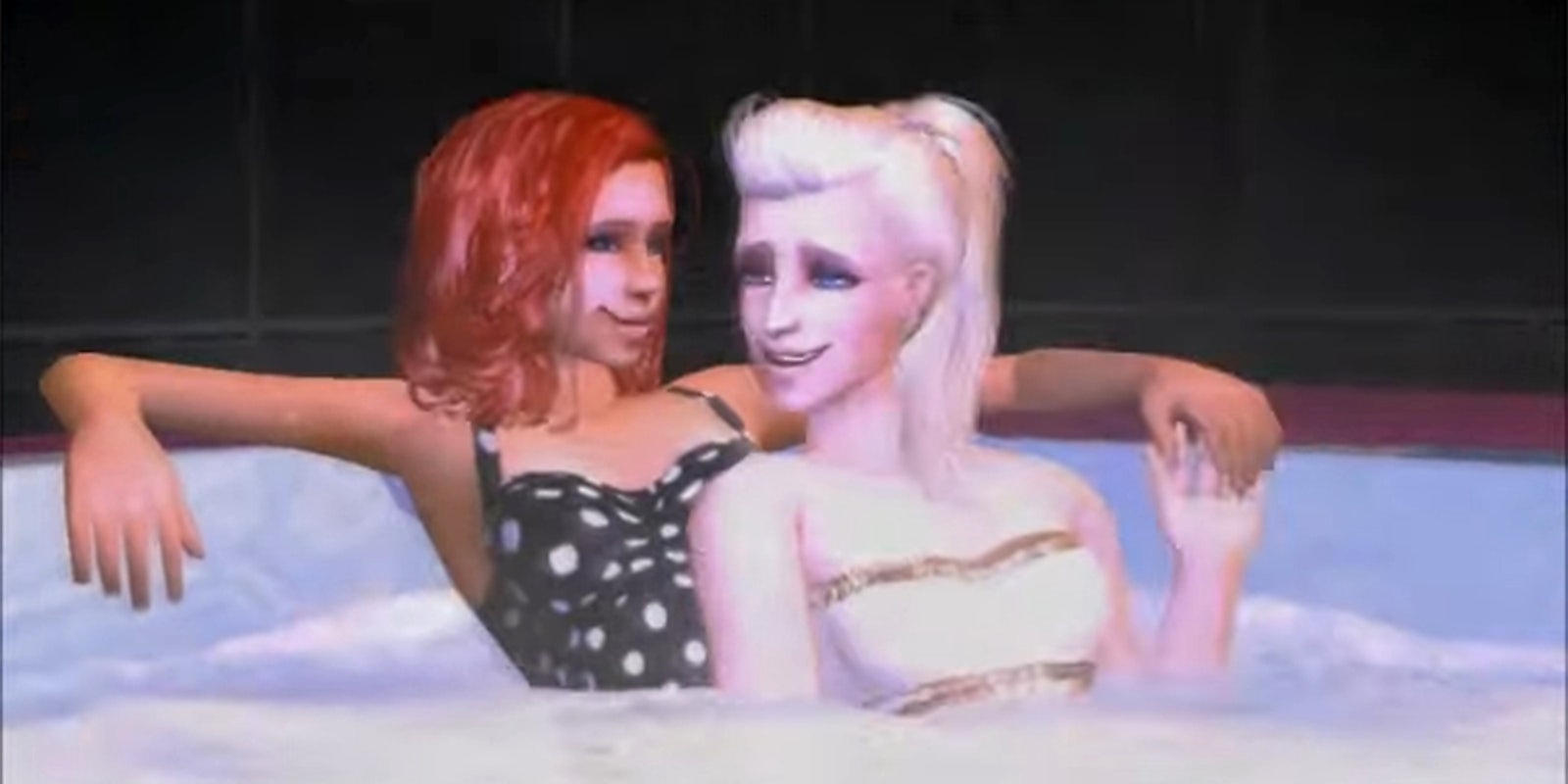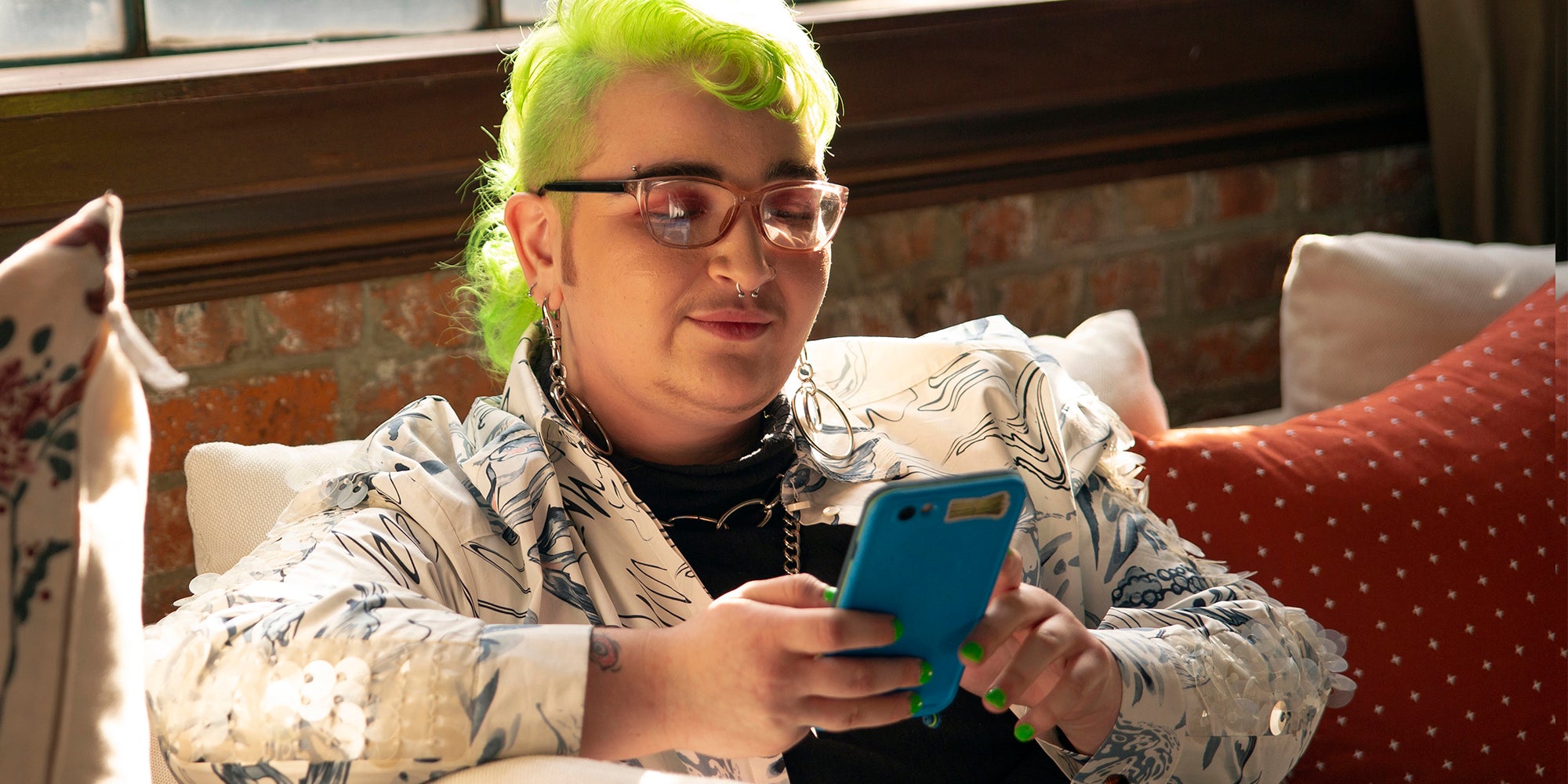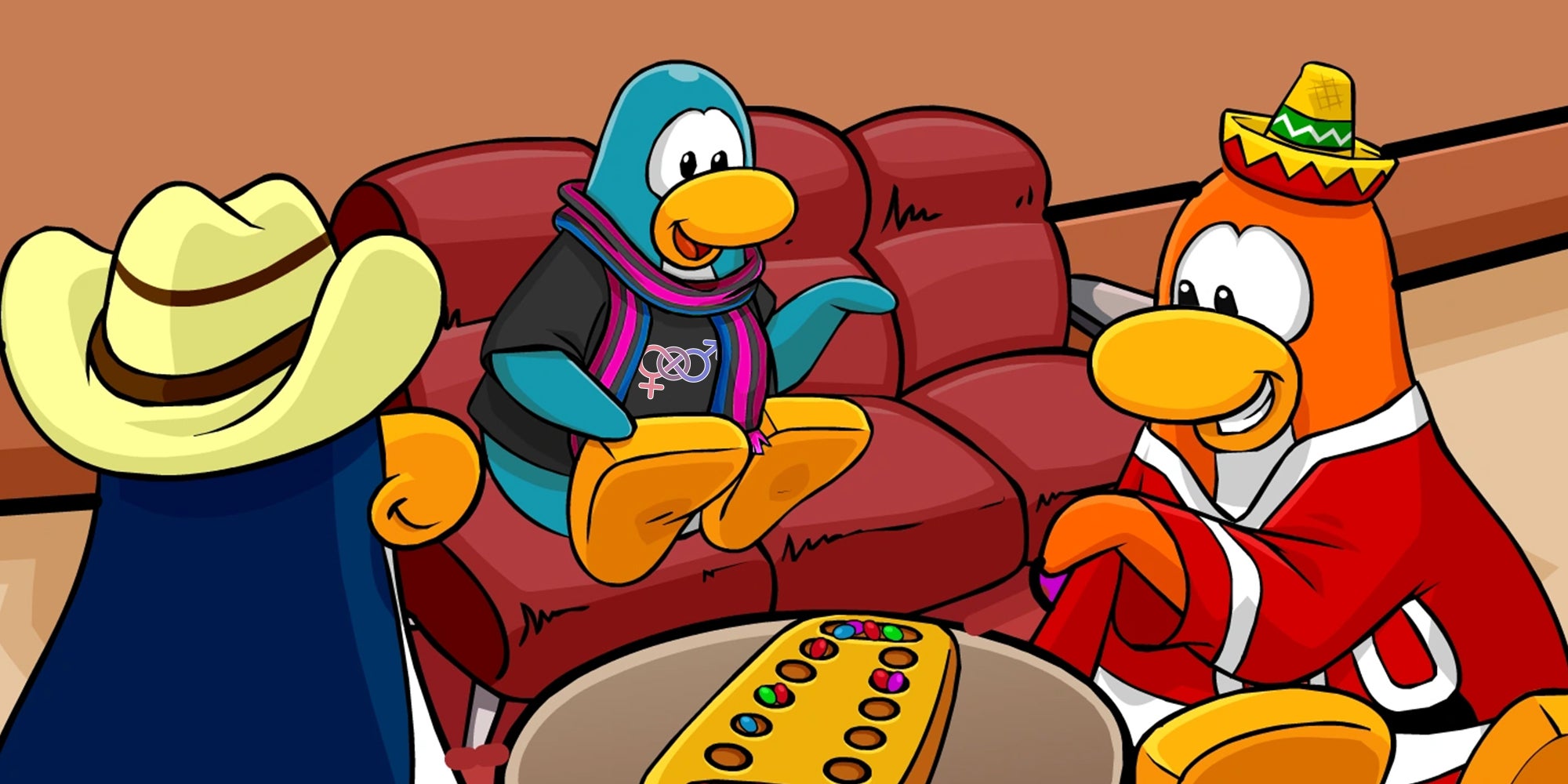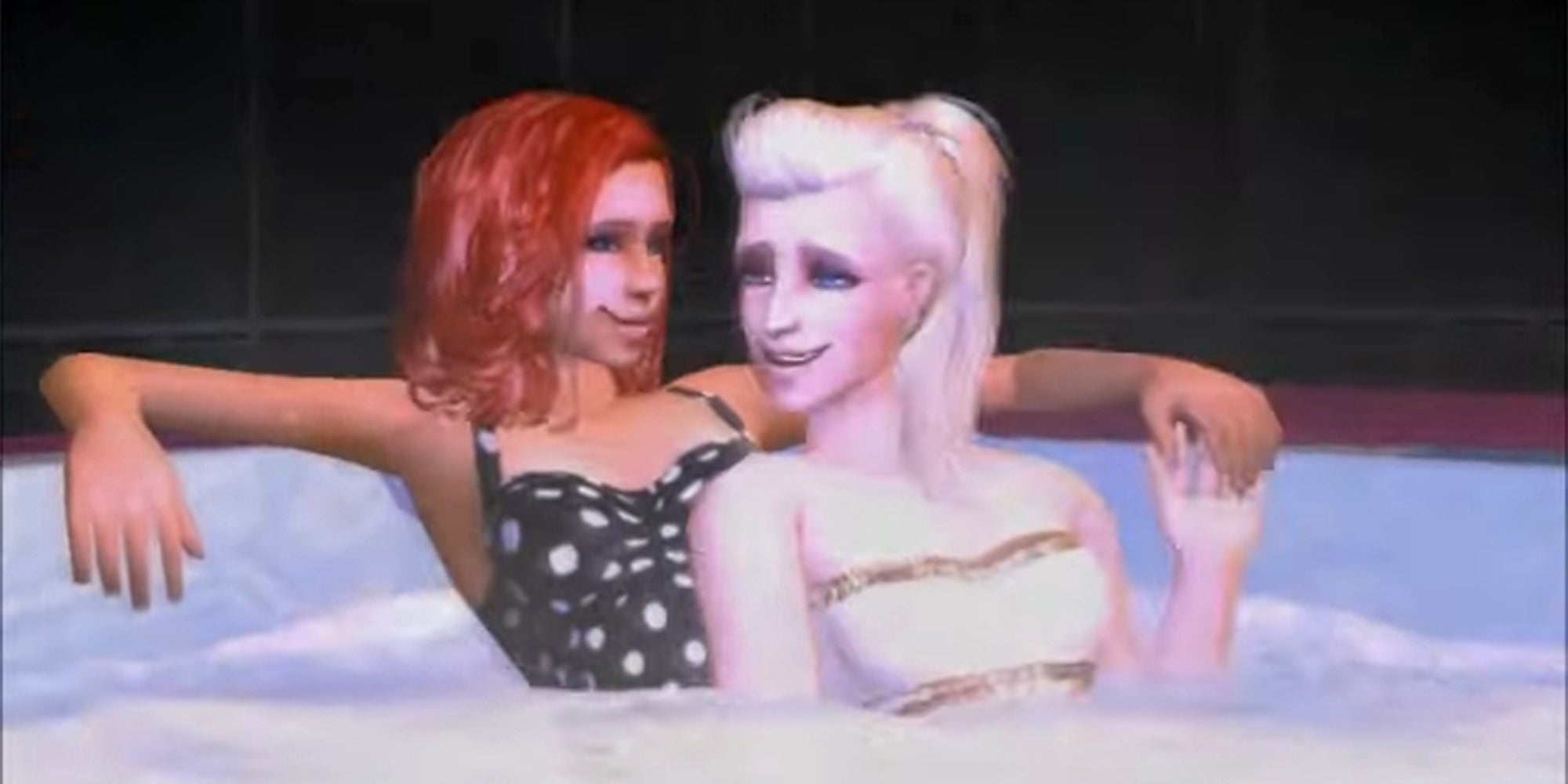I realized I was bisexual when I was 12 years old. I was on Boolprop FightTheAddiction False, a fan forum for The Sims 2, where I had lied about my age in order to sign up. It was an off-topic post in the real-life subforum, where another user had asked for advice on coming out to their parents as bi.
“That’s me,” I thought.
That’s the TL;DR version. But when we break it down, there’s a three-item chain of LGBTQ-friendliness that got me there: The Sims has always been a queer-friendly game. That, in turn, created a queer-friendly general fandom, especially with the release of The Sims 2. And that created queer-friendly specific spaces such as Boolprop.
The game: The Sims has always been queer
Since its initial release, The Sims franchise has been LGBTQ-friendly. Its original inception, The Sims, was released in February 2000 as a life simulation game. In a demo at E3 in 1999, two women Sims spontaneously kissed, showing romantic interactions weren’t limited to hetero couples.
“No other game had facilitated same-sex relationships before—at least, to this extent—and some people figured that maybe we weren’t the ideal ones to be first,” Patrick J. Barrett III, one of the game’s programmers, told the New Yorker in 2014.
In 2019, programmer and artist Don Hopkins released design documents that showed the initial prototype of The Sims did not include queer romance options. Heterosexual romance was fine, but when two women Sims were directed to kiss, the would-be kissee slapped the kisser.
“I wrote up my opinion that it should support same-sex relationships, instead of resulting in homophobic violence,” Hopkins summarized. “Subsequent design documents said heterosexual romance would not be the only kind available.”
Barrett was the programmer who ended up making the social interaction system, which saw queerness “just as a behavior that was possible at any time for any character.”
Queer couples in the game couldn’t get married, but they could adopt children. That changed incrementally: In The Sims 2 (2004), queer couples gained the ability to have civil unions, which was changed to marriage in The Sims 3 (2009). While The Sims 4 (2014) has undoubtedly the most LGBTQ representation—including pre-made gay Sims, expansive gender options, and custom pronouns—queerness has always been part of the game’s DNA.
“In The Sims it was normal and safe to be a gay person,” Barrett said. “It was the first time we could play a game and be free to see ourselves represented within.”
For many people, that’s still true. The Sims remains a game free from simulated homophobia or transphobia. It’s a way to experience queerness without any mandatory negativity or violence, letting gay Sims just… be.
The fandom: The Sims 2’s website helped players connect
The Sims 2 was a huge overhaul of the original game. It introduced countless iconic features to the franchise, such as aging, aspirations, genetics, and an open world. But it also made the most of the mid-’00s internet, making its website a social hub to showcase creativity and build community.
Players could upload builds and characters to the Sims gallery to share with others. But The Sims 2’s website also allowed users to publish stories, pairing in-game photos with a few lines of text. It was rudimentary—but revolutionary. Players could share their Sim soap operas with other fans.
“The official website hosted so many of these stories, so it really was such a place for storytelling and connecting with other readers and writers,” Jenn tells the Daily Dot over Zoom. She shot to fandom fame with her mythology-themed Alphabet Legacy, a challenge involving playing the same family in The Sims 2 for 26 generations. (The story, titled “Ancient Mythology”, is still available to read, out of order, here.)
My love of playing The Sims turned into loving The Sims 2, and from there I made the jump to looking up Sims content online. I vividly remember watching a Sims-made music video set to My Chemical Romance’s “Helena” (apparently made in 2006), browsing ModTheSims for custom content, and somewhere along the way finding “legacy challenges” on the official website.
Creators often mentioned other creators’ work, so reading one story could lead down a rabbit hole of similar content. One legacy I read mentioned Jenn’s, and Jenn’s legacies mentioned something else: Boolprop.
Besides popularizing a challenge so bananas that The Sims 4 now gives you an achievement if you complete it, Jenn had another claim to fame. She was one of the creators of Boolprop FightTheAddiction False.
The forum: Boolprop welcomed everyone
Boolprop was born from a conversion that Jenn had with Rhea, another Sims 2 creator, around 2004.
“We were just talking about the stories and we were like, ‘Hey, we should start this forum, because we love talking about these, and maybe there’s other people that want to talk about these,’” Jenn told the Daily Dot. “I hadn’t really been involved in the fandom before that. It just kind of built from there.”
The two decided to create a forum, named for the powerful in-game cheat “boolprop testingcheatsenabled true” that unlocks debug options, removing most of the game’s constraints. The site exploded in popularity.
“It was a handful of members, and then 100 members, and it just kind of took off,” Jenn said. “We were both just kind of in awe that this little forum that we created was gaining so much traction, and it kind of took off within the Sims community.”
Jenn was 18 at the time and fresh out of high school. By the time I joined in around 2006, Boolprop had thousands of members—and had turned from exclusively a Sims fan forum into a wide-ranging online community space.
Like many queer kids, I had a hard time in school. My favorite French teacher believed gay people were unnatural and shouldn’t be allowed to get married. I once got into an argument with some popular kids who supported Uganda’s proposed “Kill the Gays” bill while my physics teacher silently watched. I was bullied for my perceived sexuality from age 10, years before I even knew I was queer.
Boolprop was a place where I didn’t have to worry about any of that.
“We tried to create a really safe and welcoming environment. But all of us admins were really young ourselves when we started it,” Jenn said. “We were kind of flying by the seat of our pants.”
The site was made up of boards for legacies and challenges, plus places to share quiz results, offer graphic design services, or role-play. There were places to discuss real-world issues, too—like the advice subforum where I discovered bisexuality. (It was also where I first heard of pansexuality, which was my preferred label for most of my teens.)
“That was one area of the website I was always really proud of,” Jenn said. “In other forums, people would post personal stuff, and then they would have to try and find a way to make it related to whatever it was that the forum was supposed to be about. … I think it became a really important part of the community for a lot of people, and it really was a pretty safe space for sharing.”
One of the other big draws was the writing sub-forum, where users would share original stories. Every November, the board flooded with NaNoWriMo content as users participating in National Novel Writing Month would share their attempts to write 50,000 words in 30 days. People would read each other’s drafts, share feedback and editing advice, and cheer each other on.
That was one of the things that drew in Josh—known online in those days as dutchess_axel—who joined the forum around 2004 when they were in junior high. “I think everybody became a little bit more creative through it,” they told the Daily Dot. “I feel like it really helped my own writing grow.”
Josh put that down to Jenn’s influence. “She was the admin of the forum,” Josh said. “She kind of created that forum. And I feel like that influenced the forum as a whole.”
Josh and Jenn became friends through Boolprop, and they still keep in touch. Neither of them is straight. Interviewing them about the website made me wonder how many of the other young posters on the site were also queer and had also gravitated to The Sims and Boolprop as a place to be LGBTQ weirdos together.
“I do think Boolprop was helpful in being that open space where it was OK to be like, ‘Oh yeah, I’m not this one thing, I might be something else,’” Josh said. “It is definitely a different internet than we have today.”
Though the original website is long gone, parts of Boolprop live on. Boolprop itself still exists under different admins. Jenn and Josh, who met on the forum, are still friends. All three of us still like The Sims. And Jenn is still a writer.
She’s currently working on her third novel, all lesbian romances written under the name Jenn Alexander.
“It was kind of around the time I was coming out, and then I got into writing with it,” she said. “Now I’ve got these lesbian romance novels out, and I think it all kind of grew from Boolprop.”





